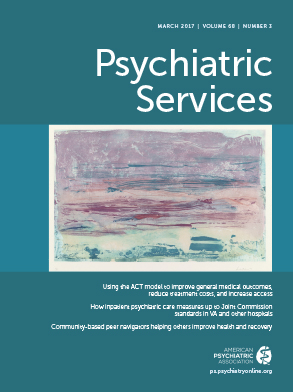IN REPLY: We appreciate the comments and opportunity to explore the issues raised in Mr. Gupta and Dr. Rosenheck’s letter. First, some data mentioned in the letter were not available for our analysis. The article by Stroup and colleagues was published the month our paper was accepted and thus was not available for inclusion our analysis (
1). The analysis presented by Gupta and Rosenheck is based on unpublished data, and therefore they were unavailable for inclusion in our model. We would certainly amend the model to include these data in future publications should they become available.
Second, Mr. Gupta and Dr. Rosenheck report somewhat contradictory results in describing their unpublished data. The authors initially state that only 3% of patients with schizophrenia were hospitalized for more than 30 days, then later state the annual psychiatric inpatient days was 31 days. These numbers seem incompatible or suggest a highly skewed distribution, which would affect the results of a cost-benefit analysis. Regardless, as one of our sensitivity analyses, we examined the impact of assuming that hospitalizations were seven days; this model also resulted in significant cost savings (
2). This result suggests that our findings are robust to a range of assumptions about the average length of stay.
Third, several of the studies mentioned may not be valid comparisons to the ones on which we based our study. The primary outcome for the Stroup study was a decrease in the number of hospital admissions rather than number of annual inpatient days, making direct application of their results to our study problematic (
2). The randomized controlled trial that Mr. Gupta and Dr. Rosenheck mention did not explicitly report utilization, but rather reported expenditures. However, for the patients discharged, Essock and colleagues reported a significant decrease in rehospitalizations (
3). The Sernyak and colleagues study did not use the standard definition for treatment resistance (failed trials of at least two antipsychotic agents) to match controls and therefore may not reflect a true difference for treatment-resistant patients (
4). This is an important difference, in that a previous study we conducted reported that almost 25% of Veterans Affairs (VA) patients receive non–evidence-based treatments prior to clozapine initiation. Thus, studies of patients who received clozapine in the VA most likely do not reflect the patient population who would derive the most benefit from clozapine (
5). In addition, both the Stroup and Sernyak studies were based on administrative data, which lack some clinical information, such as response rate, upon which our model is predicated (
1,
4).
We agree that the model is not based entirely on randomized controlled data, and there may be some regression to the mean in pre-post studies. However, this does not completely negate the utility of the data, especially in the absence of randomized studies.
In short, our model is consistent with the vast majority of literature and represents a starting point for discussing the potential benefits of clozapine in a large health care system. Certainly, the model can be further updated to reflect new information as it becomes available.

